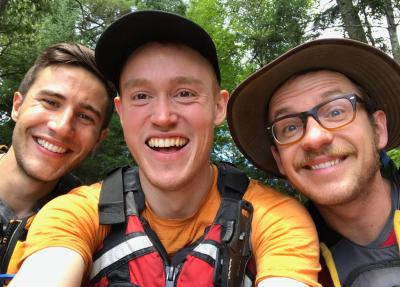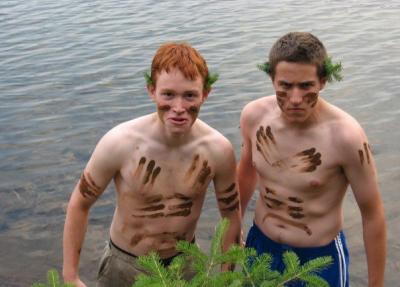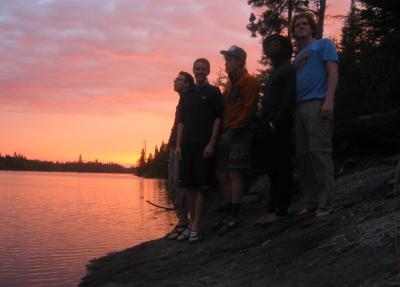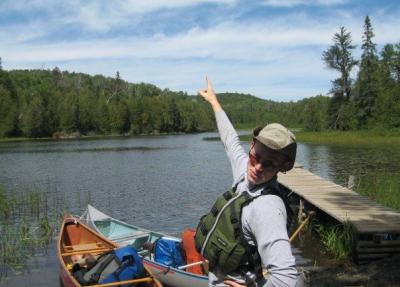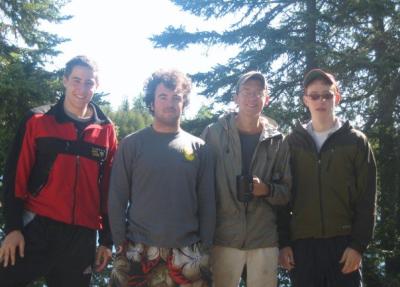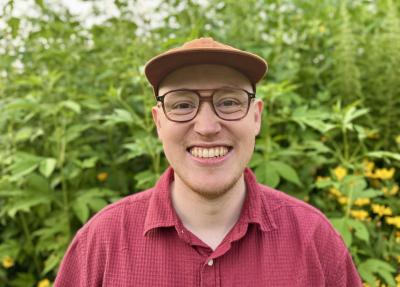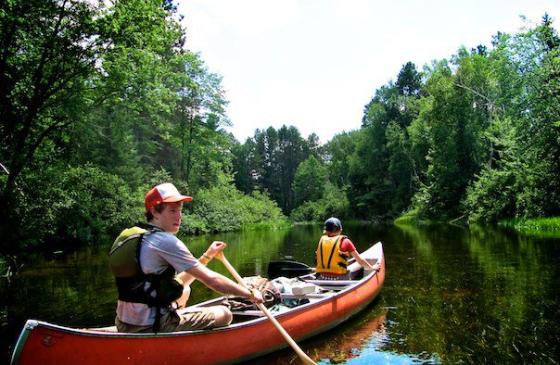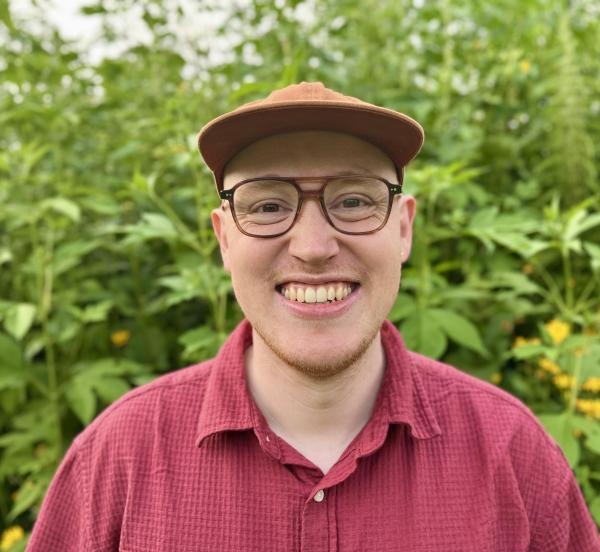
Growing up in Minnesota, Lloyd first experienced the Boundary Waters as a teenager during summer trips with YMCA camps — experiences he describes as formative, wholesome, and fun. After high school, he and his four closest friends returned for what he remembers as a coming-of-age adventure. “It was this very fun, very wholesome group of 18-year-olds going off into the woods for a week,” he says. When joking that the trip could have been a movie plot, he adds with a laugh, “It would have some really stupid parts of it. I remember paddling into the middle of this lake, smearing mud all over ourselves, putting ferns in our hair… and trying to capsize each other’s boats.” That first post-graduation trip — and the several others they’ve taken together since — cemented the Boundary Waters as a place of connection, joy, and lifelong friendship. “It’s always been this place that we’ve gone back to when we’ve needed to reconnect.”
Since then, Lloyd has returned to the Wilderness again and again — with friends, as a camp counselor, and as a leader of canoe trips. “[The Boundary Waters] has always been a place of recharge,” he says. “Whenever I’m on water, I’m always looking forward to portaging, and whenever I’m portaging, I can’t wait to get back on the water. It’s constantly like: I’m happy where I’m at, but I’m looking forward to where I’m going.”
From the trail to the board
That deep, personal connection is what eventually led Lloyd to support Save the Boundary Waters and, ultimately, to join the board. As his company, Garage Grown Gear, evolved beyond a purely subsistence business, he began thinking more intentionally about how to give back — both personally and professionally.
“Where are the areas of value that I want to be able to dive deeper into? Where are the areas within our community that we can give back to or just support?” he reflected. “[Save the Boundary Waters] was just such an obvious connection to both the state and the personal connection.”
Serving on the board offered a tangible way to align his values with action. “I can’t show up and do trail maintenance on the SHT [Superior Hiking Trail] particularly easily at this moment, but I can lend areas of expertise that I have and just finances to this thing that I care about.”
Lloyd’s business — Garage Grown Gear — a marketplace for backpacking adventures and outdoor recreation located in St. Paul, MN — has also become part of that support. As a business owner in the outdoor industry, he sees a clear and critical link between healthy public lands and a healthy economy.
“I’m selling gear to someone so they could go do a thing in a space that is free and accessible, and you want to mine on that thing? No, thank you.”
He believes outdoor businesses have an obligation to speak up for the wild places their customers depend on. “Part of the reason why the Boundary Waters is going to be protected is because of the civic ecosystem that’s around it — the local guides, the local shops, the restaurants that are up in Ely or along the Gunflint. You can’t remove the economy from the outdoors. So, I think as much as those two things can be aligned, it is a responsibility of businesses to be able to protect the areas where their customers recreate.”
For Lloyd, it all comes down to a simple but powerful truth: “The ultimate renewable resource is the land itself, and we don’t have to do anything to it other than keep it the way it is.”
Standing on years of work, and looking ahead
Though Lloyd is a newer board member, he’s aware that the protections in place today are the result of decades of determined effort.
“To be able to say, this is my first year on the board, but this fight is the result of years of work. The fact that the Boundary Waters is where it's at right now is because of generational work that's happened. And it will be protected in 50 years from now because of the work that's happening now from leaders like Ingrid [Lyons] and Becky [Rom].”
That long legacy — and the powerful coalition that continues to defend the Wilderness — gives him hope. “It gives me hope that whenever there has been adversity towards the Boundary Waters, it has been met with very strong opposition,” he said. “I think lawmakers — they're not just going to willy-nilly take a stab at the Boundary Waters, because they know that in doing so, they're poking a bear… It's not an easy fight, and if they want to get involved in it, they're going to have someone who's going to be willing to be able to punch back.”
While the political landscape is always shifting, Lloyd remains optimistic. “I think because it is largely a bipartisan issue within the state… that makes me feel positive, and that regardless of what happens, there's going to be a measured response.”
Showing up with your support
For Lloyd, protecting the Boundary Waters isn’t just about enjoying it — it’s about investing in it.
“We're at a particular juncture in time where if you want something to continue to exist, you need to support it financially,” he said. “I mean if that's public radio, if that's public lands, if it’s, I don't know if it's your favorite podcast... when you want these things to exist, it's not enough just to sit on the side. I think where you spend your money intentionally is a showing of your values.”
And that investment doesn’t need to be large to be meaningful. “So if you have had positive experiences in the Boundary Waters, if you want the Boundary Waters to be something that is around for generations, any size donation gets you more involved in doing that,” he said. “And I think that exercises a charitable muscle that can grow over time. So it doesn't have to be some massive donation, but you start off with something that's gonna feel good and you're probably gonna want to do it more, right?”
He also encourages fellow adventurers to reflect on what they get — and give — in return. “If you spend time in the Boundary Waters and you appreciate this thing — Boundary Waters permits cost next to nothing. So if you're going to be going up there and buying a permit, or going fishing or spending some time in the area, like, consider donating to an organization that keeps it available.”
A future worth protecting
Lloyd Vogel’s story is one of gratitude, growth, and grounded commitment. From muddy lakes to board meetings and business advocacy, the Boundary Waters has shaped who he is — and now, he’s giving back to help shape its future.
He said that visiting the Boundary Waters, “is a value that you want your kids and your grandkids to be able to have.” He continues, “Invest a little money in the things that matter."
As a new father, that message feels more personal than ever. Lloyd isn’t just preserving a place he loves — he’s helping ensure that his own child, and future generations, can experience the same wild joy and connection that first drew him north.
